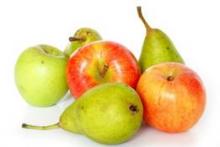NATIONAL HARBOR, MD. – "Food is what patients blame for their gastrointestinal symptoms," Dr. Peter Gibson said at the annual meeting of the American College of Gastroenterology.
And patients with functional GI disorders may be on the right track, according to Dr. Gibson, professor of medicine at Monash University in Victoria, Australia. He presented a novel dietary treatment that is not well known in the United States but appears promising as a strategy for managing irritable bowel syndrome (IBS) and other functional GI problems.
Dr. Gibson also said that physicians who want to help their patients manage their symptoms need to understand how foods can interact with the enteric nervous system, which controls most GI functions.
More specifically, certain types of sugars found in many foods are rapidly absorbed and fermented, drawing liquid into the GI tract, which can cause distension and trigger the symptoms of IBS, such as bloating and pain, he said.
The novel dietary approach is known by the acronym FODMAP, which stands for the types of sugars suspected of causing symptoms: fermentable sugars, oligosaccharides, disaccharides, monosaccharides, and polyols (such as sorbitol or mannitol). Thus the regimen designed to reduce symptoms is called a low-FODMAP diet, said Dr. Gibson.
Data are limited, but in theory, a low-FODMAP diet causes less distension of the intestinal lumen and thereby reduces IBS symptoms. His colleague, Susan Shepherd, Ph.D., who is a dietitian, has developed a list of foods that should be included, and others to exclude, when following such a diet.
In a recent study, 82 IBS patients were randomized to receive either standard dietary advice (39 people) or instruction on following a low-FODMAP diet (43 people); the patients were meeting with a dietitian on an outpatient basis (J. Hum. Nutr. Diet 2011;24:487-95).
Composite IBS symptom scores showed that significantly more patients in the low-FODMAP group had overall improvement in their symptoms, compared with the standard care group (86% vs. 49%). In addition, significantly more low-FODMAP patients reported improvements in bloating (82%), abdominal pain (85%), and flatulence (87%), compared with the standard care group (49%, 61%, and 50%, respectively).
More research is needed, but the data support the potential effectiveness of a low-FODMAP diet, Dr. Gibson said.
Some examples of foods to include as part of a low-FODMAP diet are bananas, blueberries, lettuce, potatoes, gluten-free bread or cereal products, rice, oats, hard cheeses, lactose-free milk, sugar, molasses, and most artificial sweeteners with names that do not end in "ol."*
Foods to eliminate when following a low-FODMAP diet include apples, pears, canned fruit in natural juice, high-fructose corn syrup, cows’ milk (which contains lactose), soft cheese, broccoli, cabbage, pasta, bread, or baked goods made from wheat or rye, mushrooms, and sweeteners ending in "ol," such as sorbitol.
A potential limitation of using the low-FODMAP diet is that it requires collaboration with a dietitian who is familiar with the diet, Dr. Gibson noted, and the diet is relatively unknown in the United States.
However, it may catch on, Dr. William D. Chey said in an interview at the meeting. Dr. Chey is a professor of internal medicine and director of the gastrointestinal physiology laboratory at the University of Michigan in Ann Arbor; he is also one of the two editors in chief of the American Journal of Gastroenterology.
"I think doctors are hungry for non-medical interventions" for IBS patients, Dr. Chey said. Although the diet is restrictive, many IBS patients are already on such restricted diets that the low-FODMAP diet actually broadens their food choices, which may promote adherence, he added.
More details about the low-FODMAP diet, including a complete list of foods and a database of knowledgeable dietitians, are available at ibsgroup.org/ibs-diet.
Dr. Gibson said he had no relevant financial disclosures. Dr. Chey has served as a consultant for multiple companies including AstraZeneca, Johnson & Johnson, Salix, and Takeda.
Correction: An earlier version of this story incorrectly named a few items on list of foods that may be consumed on the low-FODMAP diet. The error has been corrected.


